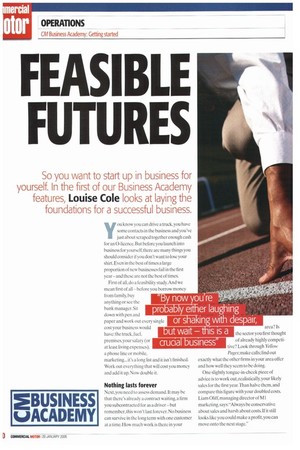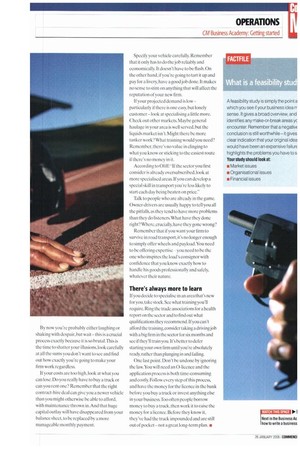FEASIBLE FUTURES
Page 60

Page 61

If you've noticed an error in this article please click here to report it so we can fix it.
So you want to start up in business for yourself. In the first of our Business Academy
features, Louise Cole looks at laying the
foundations for a successful business.
you know you can drive a truck, you have some contacts in the business and you've just about scraped together enough cash for an 0-licence. But before you launch into business for yourself,there are many things you should consider if you don't want to lose your shirt. Even in the best of times a large proportion of new businesses fail in the first year -and these are not the best of times.
First of all,do a feasibility study.And we mean first of all -before you borrow money from family, buy anything or see the bank manager. Sit down with pen and paper and work out every single cost your business would have: the truck, fuel, premises, your salary (or at least living expenses), a phone line (Jr mobile. marketing...it's along list and it isn't finished. Work out everything that will cost you money and add it up. Now double it.
Nothing lasts forever
Next, you need to assess demand. It may be that there's already a contract waiting, a firm you subcontracted for as a driverhut remember, this won't last forever. No business can survive in the long term with one customer at a time. How much work is there in your area? Is the sector you first thought of already highly competitive? Look through Yellow Pages; make calls; find out exactly what the other firms in your area offer and how well they seem to be doing.
One slightly tongue-in-cheek piece of advice is to work out, realistically, your likely sales for the first year.Than halve them, and compare this figure with your doubled costs. Liam Oliff, managing director of MI marketing, says:-Always be conservative about sales and harsh about costs. if it still looks like you could make a profit, you can move onto the next stage.
By now you're probably either laughing or shaking with despair, but wait this is a crucial process exactly because it is so brutal This is the time to shatter your illusions, look carefully at all the sums you don't want to see and find out how exactly you're going to make your firm work regardless.
If your costs are too high. look at what you can lose. Do you really have to buy a truck or can you rent one? Remember that the right contract-hire deal can give vou a newer vehicle than you might otherwise be able to afford, with maintenance thrown in.And that huge capital outlay will have disappeared from your balance sheet, to be replaced by a more manageable monthly payment. Specify your vehicle carefully. Remember that it only has to do the job reliably and economically. It doesn't have to be flash. On the other hand, if you're going to tart it up and pay for a I ivery, have a good job done. It makes no sense to stint on anything that will affect the reputation of your new firm.
If your projected demand is low particularly if there is one easy, but lonely customer look at specialising a little more. Check out other markets. Maybe general haulage in your area is well served, hut the liquids market isn't. Might there be more tanker work'? What training would you need? Remember, there's no value in clinging to what you know or sticking to the easiest route if there's no money in it According to Oliff:"If the sector you first consider is already oversubscribed, look at more specialised areas. If you can develop a special skill in transport you're less likely to start each day being beaten on price."
Talk to people who are already in the game. Owner-drivers are usually happy to tell you all the pitfalls, as they tend to have more problems than they do listeners, What have they done right'? Where,erucially, have they gone wrong?
Remember that if you want your firm to survive in road transport, it's no longer enough to simply offer wheels and payload.You need to be offering expertise you need to be the one who inspires the load's consignor with confidence that you know exactly how to handle his goods professionally and safely, whatever their nature.
There's always more to learn
If you decide to specialise in an area that's new for you, lake stock. See what training you'll require. Ring the trade associations for a health report on the sector and to find out what qualifications they recommend. If you can't afford the training, consider taking a driving job with a big firm in the sector for six months and see if they'll train you. It's better to defer starting your own firm until you're absolutely ready rather than plunging in and failing.
One last point. Don't be undone by ignoring the law. You will need an 0-licence and the application process is both time-consuming and costly. Follow every step of this process, and have the money for the licence in the bank before you buy a truck or invest anything else in your business.Too often people borrow money to buy a truck, then work it to raise the money for a licence. Before they know it, they've had the truck impounded and are still out of pocket not a great long-term plan..
































































































































































































